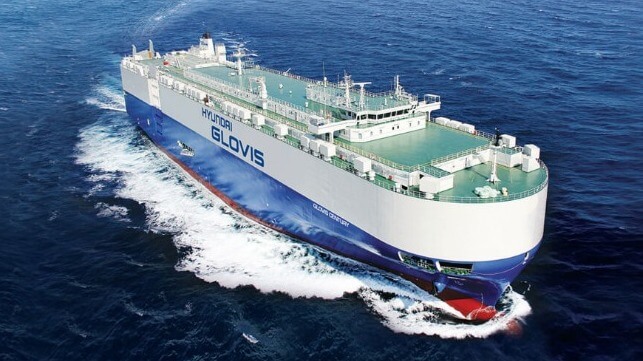Hyundai Glovis’s Board Approves Plan to Build World’s Largest Car Carriers

Hyundai Glovis, one of the largest operators of vehicle transports, is moving forward with plans to build the world’s largest car carriers each with a capacity of 10,800 vehicles. The company reported the decision of its board of directors to authorize the construction order while reporting its quarterly results and in a filing with the Korean Stock Exchange.
While reporting to investors that the company experienced a decrease in high freight SPOT volume in the car and truck carrier segment, they also showed the highest utilization of vehicle space in a decade of history for the business. Traditionally running in the low to mid 60 percent range, they reported utilization of available vessel space surpassed 70 percent in the second quarter of 2023, up better than two percentage points from 2022.
Exports of finished car OEMs they reported are expected to recover noting that there currently is limited vessel availability due to port congestion in regions such as North America (West Coast), as well as in Europe and Australia. Hyundai Glovis currently operates 78 vessels in total while citing an overall lack of vessels and capacity in the market.
The company’s board has authorized a planned $1.84 billion investment into a new fleet of vessels, which as reported would also be the largest in the industry today. The plan calls for the construction of a dozen vessels each with a 10,800 unit capacity.
“Securing a fleet of LNG dual-fuel propulsion engines to stabilize mid- to long-term fleet operations and respond to strengthened international environmental regulations,” the company reports it expects to take delivery of the vessels by September 2027. The vessel was also part of the company’s plan to achieve a better than 20 percent reduction in emissions by 2030 compared to 2021 through the introduction of LNG-fueled ships and eco-friendly trucks.

that matters most
Get the latest maritime news delivered to your inbox daily.
Currently, the sector’s largest vessels have a capacity of 8,500 units but the industry has been rushing forward with new orders to meet current and anticipated future demand. Nearly 100 new PCTCs were ordered in 2022 and with the growth of the Chinese car manufacturing industry, demand is expected to continue to grow.
Earlier last week, Norway’s Wallenius Wilhelmsen confirmed that it was moving forward with the previously announced deal to build the first four 9,350 CEU methanol-capable and ammonia-ready vessels. In August 2023, the company signed a letter of intent for the four vessels with China’s Jinling Shipyard with an option for up to eight more ships. Wallenius Wilhelmsen reports the order is part of the efforts at decarbonization with their strategy to maintain a fleet of 125 to 135 vessels.
